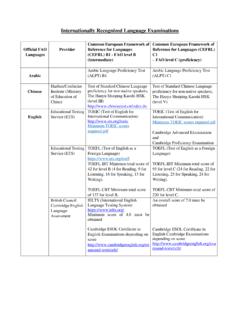Transcription of Internationalization of Higher Education: Potential ...
1 International Journal of Evaluation and Research in education (IJERE) , , December2015, pp. 196~199 ISSN: 2252-8822 196 Journal homepage: Internationalization of Higher education : Potential Benefits and Costs Tahira Jibeen1, Masha Asad Khan2 1 Department of Humanities, COMSATS Institute of Information and Technology, Lahore 54000, Pakistan 2 Psychology Department Foreman Christian College Lahore 54000, Pakistan Article Info ABSTRACTA rticle history: Received Oct 24, 2015 Revised Nov 20, 2015 Accepted Nov 28, 2015 Internationalization of Higher education is the top stage of internationalrelations among universities and it is no longer regarded as a goal in itself, but as a means to improve the quality of education .
2 The knowledge translation and acquisition, mobilization of talent in support of global research and enchantment of thecurriculum with international content are considered to be the benefits of Internationalization of Higher education . Though, Internationalization holds many positives to Higher education , there are grave risks associated with this multifaceted and growing phenomenon including commercial profit, academic colonization and difficulty in ensuring quality education . The current review has implicationsforeducational policy makers to ensure positive benefits to the Higher education institutions and the countries concerned.
3 Keyword: Academic colonization Commercial profit Dual degree Knowledge acquisition Threat to cultural value Copyright 2015 Institute of Advanced Engineering and Science. All rights reserved. Corresponding Author: Tahira Jibeen, Humanities Department, COMSATS Institute of Information and Technology, Lahore 5400, Pakistan. 1. INTRODUCTION Globalization affects different sectors of society including Higher education as it has intensified the mobility of ideas and people in this sector [1]. As the role of global interdependence has been accepted in economic, political, and social dynamics; academe s internationalizing function too has become more absorbent of interdependence.
4 All over the world, universities respond to challenges presented by globalization in various ways. One response is the Internationalization of the university campuses. In order to get benefit from the global trend, many educational institutions are trying hard to establish agreements and collaborations with regional, international and even intercontinental universities [2]. The international relations among universities have expended significantly during the past two decades [3]-[5]. The definition of Internationalization of Higher education refers to the process of integrating an international or intercultural aspect into the teaching, research and service functions of Internationalization [6]-[7].
5 Worldwide, the majority of educational institutions place a high importance to Internationalization , with Europe topping the list in this regard, followed by North America, the Middle East, the Latin America and the Caribbean. Usually, the large English speaking nations provide most services related to international Higher education initiatives and control most programs whereas Asian, Latin American middle-income,and poor nations of the developing world are the buying countries as they are unable to meet growing demand [8]-[9]. While discussing its scope and volume in future, Australian experts argued that currently two million students are studying as an international students, but approximately 15 millionstudents will study out of their countries by 2025 [8].
6 The scope of Internationalization of Higher education has taken on various degrees of interests and areas of focus that range from traditional study abroad programs, taking courses at colleges or universities in other countries through internet or face to face arrangements such as branch IJERE ISSN: 2252-8822 Internationalization of Higher education : Potential Benefits and Costs (Tahira Jibeen) 197campuses or franchises.
7 Other activities include international partnerships, academic programs and research activities that emphasize advancement of international students perspectives and skills, promotion of foreign language programs and access to cross-cultural understanding [10]. 2. Potential BENEFITS AND COSTS OF Internationalization OF Higher education The Internationalization of Higher education can be beneficial in sustaining and growing science and scholarship through dynamic academic exchanges; and building social and economic capacity in developing countries. The western universities are establishing powerful international networks and associations to mobilize aptitude and ability in favor of transfer of knowledge, advanced policies and global research for enhancing investment and measuring impact.
8 Moreover, they are using e-technology and social media as important and influential tools for increasing public access to relevant information for aiding talent recruitment and retention [10]. In this way, access is provided to Higher education in countries where local institutions cannot meet the demands. The positive aspects of Internationalization include improved academic quality, internationally oriented students and staff, and national and international citizenship for students and staff from underdeveloped countries. For developed countries, revenue generation and brain gain are Potential benefits.
9 In every respect including ratio of international students, franchiser of academic programs to foreign providers or quality guarantors, Western developed countries gain the main financial benefits [11].Other key benefits of Internationalization include diversifying and enhancing the learning environment for the benefit of domestic students, the University, and the nation. Further, it has the Potential to change the lives of international students as it helps in producing graduates who are internationally knowledgeable and cross-culturally sensitive. The student mobility allows them to transfer to a different environment, where they can understand the connections between the local environment in which they live, and the global environment [12].
10 The Internationalization of education also facilitates in engendering the international characteristics fostered in students that are desirable in a global economy such as international-mindedness and open mindedness, second language competence, flexibility of thinking, tolerance and respect for others [13]-[14]. This phenomenon also develops ethical commitment to allow students to examine their implicit and explicit beliefs and develop a sense of responsibility and civic engagement [9]. Though a lot of positive attention has been given to the Internationalization of Higher education and this process holds many benefits to Higher education , severe risks, challenges, and controversies are part of this multifaceted and growing phenomenon[15].



















